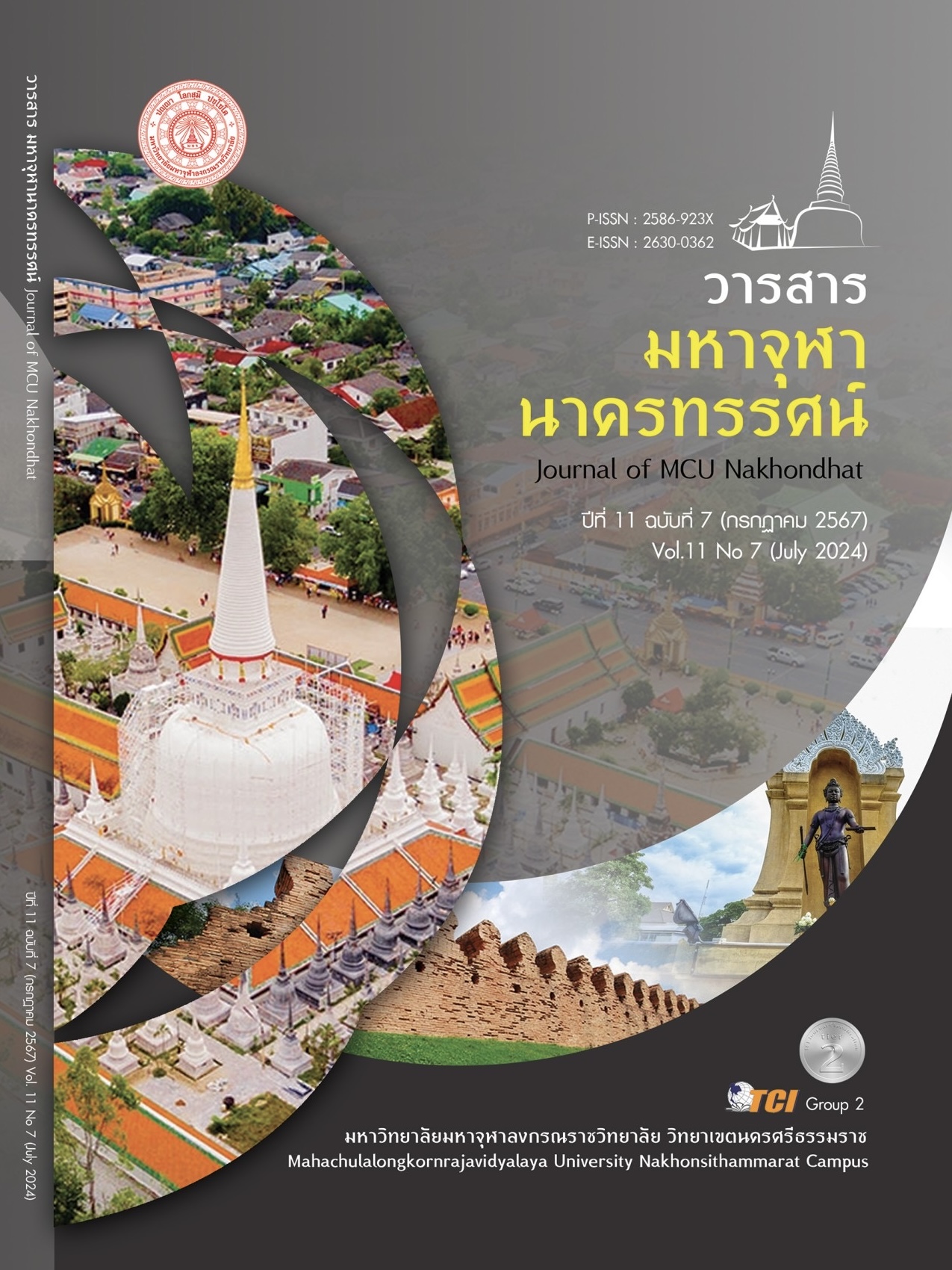QUALITY OF LIFE IN THE BUDDHIST WAY TO SUPPORT THE AGING SOCIETY
Main Article Content
Abstract
This academic article aims to present the quality of life in the Buddhist way to support the aging society. In the overall picture, the quality of life of the elderly in all 4 areas is physical. The elderly are able to adapt well to receive changes in the future. Studying modern health and medical information leads to a long life, the elderly can adapt to receive changes in the future very well. There is a study of up-to-date health and medical information. It makes you have a long life. Psychologically, the elderly are mentally fragile. Therefore, we must change our thoughts and attitudes in order to become an elderly person from an early age. We must apply Dhamma principles to life. Use mindfulness and wisdom to solve problems. Mental health is therefore strong. Social relations, elderly people must know themselves in participating in activities together and must be appropriate for them, such as participating in the Elderly School Project, Tai Chi, Elderly Club. Learning about career groups that are of interest and can increase income by promoting the use of the wisdom of the elderly. And environmental In terms of the physical well-being of the elderly, such as pollution-free housing and well-ventilated air. There are health care facilities near the house. Recreational activities are organized and interesting and income-generating careers are practiced. As for the principles of Buddhism and enhancing quality of life It will be consistent with the elements of having a good quality of life. When the principles of the Three Characteristics, the four principles of meditation and the principles of the Eightfold Path are integrated, there will be a causal connection. Has the potential to manage problems When living life in the right way, elderly people will move forward in peace and not suffering. Don't be a burden to yourself. children and society because they are firmly committed to morality.
Article Details

This work is licensed under a Creative Commons Attribution-NonCommercial-NoDerivatives 4.0 International License.
References
กรมอนามัย กระทรวงสาธารณสุข. (2563). คู่มือแนวทางการส่งเสริมสุขภาพดี ชะลอชรา ชีวายืนยาว. กรุงเทพมหานคร: สํานักอนามัยผู้สูงอายุ กรมอนามัย กระทรวงสาธารณสุข.
กองส่งเสริมสวัสดิการและคุ้มครองสิทธิผู้สูงอายุ. (2562). กรมกิจการผู้สูงอายุแนวทางการดำเนินงานธนาคารเวลาของประเทศไทย. กรุงเทพมหานคร: บริษัทอมรินทร์พริ้นติ้งแอนด์พับลิชชิ่ง จำกัด (มหาชน).
จิรายุ สุวรรณะ และคณะ. (2566). สังคมสูงวัยกับวิถีพุทธ: การเดินทางแห่งปัญญาและความเมตตา. วารสารการพัฒนาเชิงพื้นที่และนโยบาย, 1(3), 67-76.
ชมพูนุท พรหมภักดิ์. (2556). การเข้าสู่สังคมผู้สูงอายุของประเทศไทย. วารสารวิชาการ สํานักวิชาการ สํานักงานเลขาธิการวุฒิสภา, 3(16), 1-19.
ปัณณธร เธียรชัยพฤกษ์และคณะ. (2566). การพัฒนากิจกรรมการเรียนรู้เพื่อเสริมสร้างคุณภาพชีวิตผู้สูงอายุ จังหวัดราชบุรี. วารสารมจร พุทธปัญญาปริทรรศน์, 8(4), 264-274.
พระธรรมปิฎก (ป.อ.ปยุตโต). (2550). รุ่งอรุณการศึกษาเบิกฟ้าแห่งการพัฒนาที่ยั่งยืน. (พิมพ์ครั้งที่ 6). กรุงเทพมหานคร: บริษัท พิมพ์สวย จำกัด.
พระวิมาน คมฺภีรปญฺโญ และภานุวัฒน์ สิงห์คำป้อง. (2567). พัฒนากระบวนการจัดการสังคมผู้สูงอายุแบบมีส่วนร่วมของชุมชนฐานรากในอำเภอเมืองจังหวัดมหาสารคาม. วารสารเสฏฐวิทย์ปริทัศน์, 4(1), 82-97.
พระวีระพงษ์ วิชฺชาธโร และคณะ. (2564). การประยุกต์หลักพุทธธรรมในการดำเนินชีวิตของผู้สูงอายุ ตำบลผักตบ อำเภอหนองหาน จังหวัดอุดรธานี. วารสารสถาบันวิจัยพิมลธรรม, 8(1), 63-73.
พระสมุห์สุรินทร์ รัตนโชโต และพระศักดิ์จรินทร์ ฐิตสํวโร. (2566). บทบาทของวัดและการพัฒนาวัดคุณภาพชีวิตผู้สูงอายุในสังคมไทยตามหลักพระพุทธศาสนา. วารสารของนวัตกรรมและการจัดการเชิงพุทธ, 6(5), 171-184.
พระสันต์ทัศน์ คมฺภีรปญฺโญ (สินสมบัติ). (2566). แนวทางประยุกต์การปฏิบัติตนในสถานการณ์วิกฤตโควิดตามแนวพระพุทธศาสนา. วารสารวิจยวิชาการ, 6(2), 29-40.
ยากร หวังมหาพร. (2567). โครงการระหว่างวัยด้านการศึกษาเพื่อการมีส่วนร่วมในกิจกรรมทางสังคมของผู้สูงอายุไทย. วารสารวิทยาการจัดการ มหาวิทยาลัยราชภัฏสกลนคร, 4(1), 1-12.
ราชบัณฑิตยสถาน. (2556). พจนานุกรมฉบับราชบัณฑิตยสถาน. (พิมพ์ครั้งที่ 2). กรุงเทพมหานคร: บริษัท นานมีบุ๊คส์พลับลิเคชั่นส์ จำกัด.
สำนักส่งเสริมและพัฒนาสุขภาพจิต กรมสุขภาพจิตกระทรวงสาธารณสุข. (2558). คู่มือความสุข 5 มิติสำหรับผู้สูงอายุ (ฉบับปรับปรุง). (พิมพ์ครั้งที่ 6). กรุงเทพมหานคร: โรงพิมพ์ชุมนุมสหกรณ์การเกษตรแห่งประเทศไทย จำกัด.
อมราวรรณ ทิวถนอม. (2557). ดัชนีความอยู่เย็นเป็นสุขร่วมกันในสังคมไทย. วารสารเศรษฐกิจและสังคม, 51(2), 6-16.
Caregiver. (2567). ธนาคารเวลาแห่งสวิตเซอร์แลนด์. เรียกใช้เมื่อ 20 มีนาคม 2567 จาก https://shorturl.asia/gucf4


